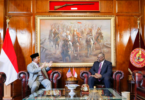F.P. Report
BRUSSELS: In response to an invitation by the Independent Electoral Commission of the Republic of The Gambia, the European Union will deploy an EU Election Observation Mission (EOM) to observe the presidential election scheduled for 4 December 2021.
Josep Borrell, High Representative of the Union for Foreign Affairs and Security Policy and Vice-President of the European Commission, has appointed Mr Norbert Neuser, Member of the European Parliament, as Chief Observer.
High Representative/Vice-President Josep Borrell said: “Anchoring the democratic change that the Gambian people achieved in 2017 continues to be on top of the EU agenda. This will be the first EU mission to observe a presidential election in The Gambia and its deployment reaffirms our commitment to supporting the consolidation of democracy. Under the leadership of Chief Observer Mr Neuser, the EU EOM will provide an independent, evidence-based assessment of the electoral process and work together with Gambian citizens to consolidate the democratic advancements.”
The Chief Observer, Mr Neuser, said: “I believe it is crucial for the European Union to accompany these presidential elections in The Gambia. I am confident that citizens will actively scrutinize the process and I trust that state authorities, political parties and all candidates will play their part in promoting a peaceful and credible election.”
The Core Team of the EU Election Observation Mission consists of 9 election experts who will arrive in Banjul on 27 October and stay until the completion of the electoral process. On 4 November, 16 Long-Term Observers will join the mission and will be deployed across The Gambia’s 7 regions. Their capacity will be reinforced by 16 Short-Term Observers from Europe and several locally recruited Short-Term Observers on election day.
After election day, the mission will issue a preliminary statement and hold a press conference in Banjul. A final report, including recommendations for future electoral processes, will be presented and shared with stakeholders after the finalisation of the entire electoral process.
Background
Following The Gambia’s peaceful democratic transition in early 2017, the EU deployed an EOM for the parliamentary elections in 2017 and an Election Follow-up Mission (EFM) in 2019. This will be the second time the EU deploys an EOM to The Gambia, but the first mission to observe a presidential election in the country.
Council adopts visa measures against The Gambia: The Council has decided to temporarily suspend the application of certain provisions in the visa code to nationals of The Gambia. This decision was taken due to the country’s lack of cooperation on readmission of third-country nationals illegally staying in the EU.
“No migration policy can function without the effective return of those who don’t have the right to stay. All countries have an obligation under international law to the readmission of their own nationals and we expect this obligation to be fulfilled. Today’s decision, the first applying the new mechanism, is a clear sign of our strong commitment to use all relevant tools to improve cooperation on readmission.”
Aleš Hojs, Minister for the Interior of Slovenia
The following provisions have been temporarily suspended for nationals of The Gambia:
- possibility of waiving requirements with regard to the documents to be submitted by visa applicants
- limitation of the processing period to 15 calendar days and, as a consequence, restriction of the extension of this period to 45 days
- issuing of multiple entry visas
- optional visa fee waiver for holders of diplomatic and service passports
Background
The European Council and the Council have repeatedly highlighted the need to achieve real progress on return and readmission. They have called for consideration of the use of all necessary leverage, including visa policy.
In 2019, the EU updated the visa code and introduced a mechanism to use visa processing as leverage in cooperation with third countries on readmission. Under this mechanism, the Commission regularly assesses third countries’ cooperation on readmission. Where a country is not cooperating, the Commission proposes that the Council adopt an implementing decision applying specific restrictive visa measures.
The first Commission assessment under the new mechanism was adopted on 10 February 2021. On the basis of this assessment and further engagement with third countries, in July 2021 the Commission proposed to adopt temporary visa measures applying to The Gambia, Bangladesh and Iraq. The proposed measures for Bangladesh and Iraq are currently under discussion within the Council.






